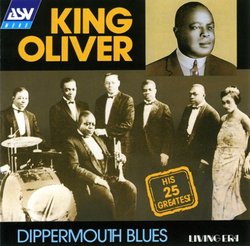Amazon.comIn the prewar years in New Orleans and the early years of Chicago jazz, Joe "King" Oliver reigned supreme, his stirring lead cornet and varied mute work inevitably at the head of the finest group of musicians available. His Creole Jazz Band of 1923--with a young Louis Armstrong on second cornet, Lil Hardin Armstrong on piano, Johnny Dodds on clarinet, and Baby Dodds on drums--produced the first great jazz records. This overview of Oliver's career begins with six examples of his 1923 work, a meld of precision and invention that retains its excitement today. With rapidly changing fashions in music, Oliver opted to expand his band, and the bulk of the material here comes from the years 1926-28, when the cornetist led his Dixie Syncopators. While these 14 tracks may lack the genius of the first recordings, Oliver remained a significant force, a master of instrumental blues usually partnered by one of the great New Orleans clarinetists, whether Dodds, Barney Bigard, or Albert Nicholas. Increasingly, the band synthesized the elements of New Orleans jazz and more composed sectional writing. The final tracks follow Oliver to New York and include the novelty tune "Everybody Does It in Hawaii," with Roy Smeck adding his Hawaiian guitar to Oliver's increasingly dated style of jazz. The final "Shake It and Break It," from 1930, has Oliver, with mounting dental problems, concentrating on his muted work and ceding an open trumpet solo to a younger New Orleans trumpeter, Henry "Red" Allen. Like other titles in the ASV/Living Era series, this CD presents a fine portrait of an early jazz giant, with consistently good sound and careful selection. --Stuart Broomer


 Track Listings (25) - Disc #1
Track Listings (25) - Disc #1